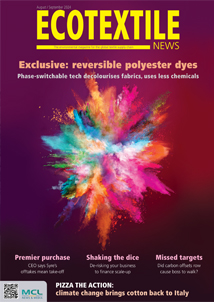BARCELONA – The leaders of the world’s largest textile chemical and dyestuff producers will together take part in a unique panel discussion on harmonisation and transparency within textile chemical management at the forthcoming Planet Textiles sustainability summit which is being held in June at ITMA.
Taking the stage together for the first time at the event will be Xander Wessels the CEO of Archroma, Eric Hopmann, CEO of DyStar and Rohit Aggarwal, President of Huntsman Textile Effects who will provide delegates with a unique insight into the challenges and potential solutions for effective, transparent chemical management.
The session will be moderated by John Mowbray, the founder and editor of Ecotextile News.
Over the past 12 months there has been intense discussion and concern within the textile dyes and chemicals supply chain about the proliferation of new standards, increased supply chain complexity and a duplication of efforts in the environmental management of textile chemistry.
Eric Hopmann, CEO of DyStar told us that his company has an: “Explicit intention to work towards a greater harmonisation of an industry standard and challenge the proliferation of standards and approaches,” which he claims the textile industry is now facing.
“Our aim is to reduce complexity, duplication and misunderstanding provoked by this proliferation of standards which ultimately does not help the final consumer,” Hopmann says, “With this we also aim at accelerate the elimination of hazardous chemicals within the supply chain.”
It’s a view shared by Rohit Aggarwal, President, Huntsman Textile Effects who will emphasise the changes his company is making to address these issues at Planet Textiles. He told us: “Huntsman Textile Effects is a strong advocate of initiatives to eliminate hazardous chemicals from the textile supply chain. We’re also a firm believer that a transparent, harmonised approach is what our industry needs to become more sustainable,” noting that Huntsman, is “actively engaged in driving innovation, greater harmonisation and elimination of hazardous chemistry.”
Register to attend Planet Textiles 2019.
Timescales?
But Xander Wessels, CEO, Archroma, will question whether the industry is actually going at the right speed to achieve these goals. “When we as an industry discuss harmonisation and transparency, the question is: are we driving changes fast enough and far enough?” he noted. “Brands, retailers and manufacturers – together and with an integrative approach across the whole value chain – we must be the transformation leaders that our world urgently needs!”
The panel discussion will also centre around transparency in supply chains and the preferred method (of the big chemical suppliers) to deliver this. “An holistic approach of systems being based upon input stream management in combination with chemical manufacturing competence auditing is the preferred industry platform to assess consistent compliance of branded commercial dye/chemical formulation to a standard,” he explained. “This gives the highest degree of confidence to the stakeholders of the textile value chain.”
Obviously, there are other alternatives out there, which the panel will also discuss, and the three industry leaders will also offer examples of key innovations and breakthroughs which they believe can make real-world, workable and demonstrative changes to reduce the impact of the textile dyeing sector on the environment.
Held at the forthcoming ITMA exhibition in June, this C-suite panel discussion is already being highly anticipated by delegates that have signed up.
Planet Textiles takes place June 22nd in Barcelona and already looks set to sell out even quicker than last year’s event, with only 420 tickets available in total.








































